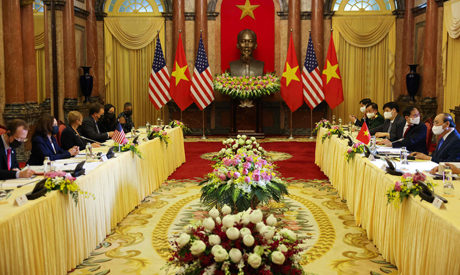
Harris meets Vietnam’s president during a bilateral meeting at the Mirror Room of the Presidential Palace, in Hanoi, Vietnam
The recent visit by US Vice President Kamala Harris to the two Southeast Asian states of Singapore and Vietnam coincided with the US withdrawal from Afghanistan. Many of the region’s states were previously exposed to waves of terrorism, and the Taliban’s takeover of power definitely raises fears of new ones, especially if they develop alliances with fundamentalist armed groups in this part of the world. But experts generally believe that the connection between Harris’ visit and the withdrawal from Afghanistan is weak.
According to Douglas H Paal, a Carnegie expert, the plan for Harris to visit Southeast Asia was made before the crisis in Afghanistan. Paal, who previously worked on Asia in the White House, in National Security Council and the US State Department, it is commendable Harris went ahead with her visit despite the distraction of the crisis, because it is important to intensify “the involvement of senior officials in the region, as part of redirecting American attention from wasting efforts in the Middle East to growing challenges in Asia.”
Yet he thinks it is “at best too early” to say whether the Taliban will represent a threat to Southeast Asia. “I would be more inclined to worry about Taliban weakness eventually permitting a home for IS-K or other radical groups that might seek to propagate support in Southeast Asian Muslim communities. So far, the threat seems more theoretical than real,” he pointed out. It is worth mentioning that Harris’ boss, President Joe Biden, has not yet spoken with any Southeast Asian leader, although many of his top officials did and visited the region. Asia will continue to be an arena in which the Americans and the Chinese compete for hegemony for years to come. These too are factors suggesting that Harris might not be going to Southeast to speak about Afghanistan.
However, ironically, she took questions from reporters about it, together with the leaders she met. “We hope Afghanistan does not become an epicentre for terrorism again,” Singapore Prime Minister Lee Hsien said at a press conference with Harris. Lee added that the US commitment to the region would be determined by “what the US does going forward, how it repositions itself in the region, how it engages its broad range of friends and partners and allies.”
Seeking to avoid bearing her share of the responsibility for the US withdrawal from Afghanistan by saying that she was one of the last advisers that Biden spoke to about the issue, Harris had to say something to persuade the Asians that the United States does not abandon its allies. She stressed that Washington is “singularly focused” on evacuating Americans and “Afghans who have worked with us” and are vulnerable, including women and children.
Ann Marie Murphy, director of the Center for Foreign Policy Studies at Seton Hall University, told Al-Ahram Weekly that the US withdrawal made Harris’ objective of ensuring
US commitment to the Indo-Pacific region “more difficult, since it raised questions about US credibility as a partner.” Murphy, who previously briefed the US Congress on Asia, stressed that Southeast Asian countries that have been the victims of terrorist attacks like the Philippines and Indonesia “will be watching developments closely.”
“There are numerous terrorist groups in SEA, and after the fall of ISIS in the Middle East, many SEA jihadist groups allied with ISIS heeded the call to stay home. It is unclear how the Taliban’s restoration of power in Afghanistan will impact terrorist groups in SEA because it is unclear how the relationship between a Taliban government and other groups like ISIS will evolve,” Murphy nevertheless argued.
The visits gave Harris an opportunity to talk business with Asian leaders. She told the Vietnamese President Nguyen Xuan Phuc that both countries need to “find ways to pressure and raise the pressure, frankly, on Beijing to abide by the United Nations Convention on the Law of the Sea, and to challenge its bullying and excessive maritime claims” in the South China Sea.
Harris also announced that the USAID will back Vietnam on a number of challenges, including Covid-19, growing its business sector, digitalising its economy, reforming education and “addressing legacy of war issues”.
The same happened with Singapore, which during Harris’ visit finalised deals with Washington over financial cooperation, military and cybersecurity affairs. For example, they agreed that the United States will begin “rotational deployments of US P-8 aircraft and littoral combat ships to Singapore”. They will also work together on smart cities and green building throughout the Association of Southeast Asian Nations (ASEAN) member states. At least for now, these deals might help reduce the security concerns of the Southeast Asian governments about the implications of the US departure from Afghanistan.
According to John A Calabrese, an assistant professor at the Washington-based American University School of International Service, officials in countries like Indonesia and Malaysia “remain very concerned with potential blowback and returnees from the conflict in Syria. I would guess that, given the fluid situation in Afghanistan and uncertainty as to whether that country might once again become a hive of jihadi activity their counterterrorism teams, as well as those in Singapore and Philippines -- not to mention India, China, Russia and the Central Asian states -- are already on high alert, moving quickly to enhance their surveillance and taking other measures to detect and disrupt potential terror threats.”
*A version of this article appears in print in the 2 September, 2021 edition of Al-Ahram Weekly
Short link: